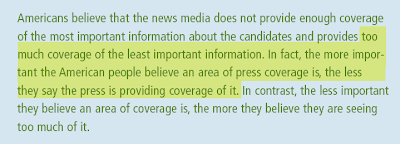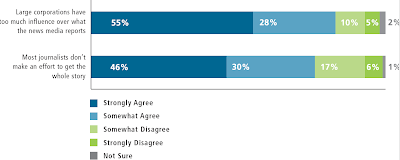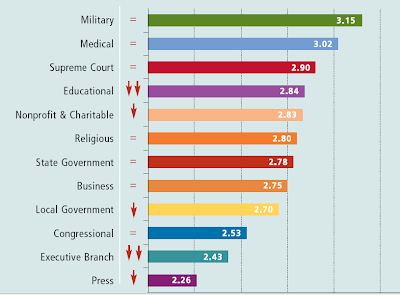(updated below)
John Harris, former National Political Editor of The Washington Post and current Editor-in-Chief of The Politico, wrote a column yesterday acknowledging the extremely obvious truths about his “profession” — that because they are obsessed with attracting traffic-generating links, they focus on empty trivialities at the expense of substantive news:
The signature defect of modern political journalism is that it has shredded the ideal of proportionality.
Important stories, sometimes the product of months of serious reporting, that in an earlier era would have captured the attention of the entire political-media community and even redirected the course of a presidential campaign, these days can disappear with barely a whisper.
Trivial stories — the kind that are tailor-made for forwarding to your brother-in-law or college roommate with a wisecracking note at the top — can dominate the campaign narrative for days. . . .
As leaders of a new publication, Politico’s senior editors and I are relentlessly focused on audience traffic. The way to build traffic on the Web is to get links from other websites. The way to get links is to be first with news — sometimes big news, sometimes small — that drives that day’s conversation.
Harris detailed numerous examples where he and other journalists blew up unimportant items into huge stories that dominated the news narrative because they thought that doing so would attract attention for themselves.
There are all sorts of points that can be made about Harris’ self-evident confessional, but let’s begin with the fact that, last March, I wrote numerous posts criticizing The Politico for precisely this vapid, link-chasing mentality in the context of its endless coverage of the “Edwards hair” story which its reporter, Ben Smith, “broke.” One post was titled: “The Politico: Gossip rag masquerading as news organization?” Another focused on The Politico‘s obvious obsession with securing critical traffic-producing links from Matt Drudge.
Harris angrily replied to my posts via email, which led to an e-mail exchange which I published (with his consent). Compare Harris’ admission yesterday of what motivates The Politico to the high-minded, pompous lecture he gave me last year about how, as Real Journalists, he and The Politico are far above such lowly, traffic-generating motives (in contrast to “ideologically motivated” bloggers):
One point you made that resonated with me as a journalistic matter is the danger that reporters might orient their thinking around chasing the needle, and measure their success by web traffic and links. Conscientious reporters and editors should resist this, and I believe we do. This is reflected in the range of serious reporting we do about Congress, the 2008 presidential election, and lobbying and fund-raising. Although we are a new publication, Politico has several reporters and editors who have been in this profession for two decades or more. They know that what counts is reputation over the long haul, not any individual story or any uproar du jour on the blogs.
What Harris self-righteously and condescendingly denied in our exchange last year is exactly what he admitted to yesterday — namely, that the establishment political journalists who dominate our news narrative (and those who run The Politico) fixate on meaningless, ephemeral trivialities in lieu of substantive reporting. Anyone paying even minimal attention to the coverage of the presidential race already knows this full well. And it was, after all, Harris (along with his co-author, Time‘s Mark Halperin) who admitted that “Drudge rules their world.” But it’s still notable that Harris now acknowledges that what he calls “important stories” regularly “disappear with barely a whisper,” while “trivial stories” (of the type The Politico and most establishment political journalism specialize in) “dominate the campaign narrative for days.”
In numerous ways, Harris’ proclaimed self-awareness only goes so far. While he points to his newspaper’s role in “breaking” the Edwards hair story — and admits, with great understatement, that he “was not exactly despairing when other websites and cable TV networks went way overboard on the story, with citations to Politico” — he also claims that The Politico itself “handled that news nugget with a decent sense of proportion.” Actually, The Politico alone published at least eight items on Edwards’ haircut in that two-week period. Perhaps when compared to subsequent fixations on matters such as Barack Obama’s lapel pin and bowling score, The Politico‘s “flood-the-zone” coverage of Edwards’ hair counts as restraint.
Harris’ mea culpa is also woefully incomplete. The belief that petty items will attract links is only one of the motives driving political journalists to fixate on trivialities, and it’s probably not even the most significant reason. “Reporting” gossip is incredibly easy to do, and requires little effort and, more importantly, no critical thought. Harris, for instance, recounts his disappointment that The Politico‘s Jonathan Martin wasn’t the first one to post the comments made by Hillary Clinton on Friday about the RFK assassination, and thus, to compensate, he pushed Martin to be the first to post any statement about Clinton’s comments from the Obama campaign:
I urged Martin to keep his foot on the gas: Be the first to post reaction from the Obama campaign. Obama spokesman Bill Burton quickly obliged, denouncing Clinton’s comments and saying such sentiments have “no place in this campaign.” Burton’s comments quickly went into Martin’s blog post. Soon enough, several websites and cable news outlets were giving the story trumpet-blaring treatment.
That’s the defining activity of the modern American political journalist: copy down what political officials and campaigns say. That’s what they consider to be “reporting.” Their “scoops” are determined by whoever gets chosen to be the first one to copy down (or cut and paste) those statements first. They focus on trivial stories not only because they think doing so will get them quick attention, but also because — by definition — trivial chatter requires no analysis, thought, or critical faculties.
The real harm inflicted by the behavior Harris describes isn’t that we’re all subjected to an endless stream of worthless gossip from our political journalists. That’s more of an avoidable annoyance than anything else. It’s that the trashy gossip completely crowds out any discussion of anything that actually matters, allowing our government and political class generally to get away with the most extreme acts of corruption, lawbreaking and destruction while those assigned to “report” on what they’re doing prattle on about haircuts, horse races, and an endless stream of soap opera storylines. Those who know best how to feed journalists their easy, gossipy items are those who best manipulate their “reporting.”
That’s why all one can do is laugh bitterly at proclamations like this one from Joe Klein, wherein he laments that the presence of Lou Dobbs on CNN is so terribly inconsistent with the important political journalism that network and its reporters do:
Given the amount of serious journalism going on at CNN — the reporters risking their lives on battlefields all over the world, fine journalists like John King and Candy Crowley working to report the presidential campaign accurately, the excellent fact-checking that Wolf Blitzer did earlier this year on the Obama Madrasa smear — given all that and a nearly thirty year history of really trying to present the facts straight . . . I’ve got to wonder why the network allows Lou Dobbs to continue spewing false, inflammatory nonsense under the guise of objective journalism.
Indeed. Thank God for John King and Candy Crowley and all of CNN’s “serious” penetrating investigative journalism. Political power quakes in its boots when they come calling. Most journalists, on some level, are likely aware of the truths that Harris partially admitted to yesterday about their profession (but which he denied last year). It is, I suppose, somewhat refreshing when someone like Harris drops the Serious Watchdog Journalist mask which Joe Klein donned for yesterday’s post (and which Harris donned during last year’s email exchange) and, instead, acknowledges what they really do.
UPDATE: In addition to how destructive is the premise that readers and viewers crave trivial political reporting, that claim also seems quite factually dubious. The same media outlets which operate on this assumption — network news programs and newspapers — watch as their viewership and readership disappears. Given their performance, they shouldn’t be particularly confident in their ability to know what the public wants.
Moreover, polls consistently show that Americans hate the type of political coverage our establishment press feeds them. A comprehensive study (.pdf) by Harvard’s Kennedy School of Government and U.S. News and World Report is very instructive:

Specifically, Americans overwhelmingly believe “media coverage” of the 2008 presidential race focuses “too much on trivial issues”:

They also say — again, overwhelmingly — that “large corporations have too much influence over what the news media reports” and “most journalists don’t make the effort to get the whole story”:

Similar data demonstrates that Americans overwhelmingly believe that the media provides far too little coverage of substantive issues and policy debates and far too much coverage of petty gossip and personality-based attacks.
It’s therefore unsurprising that the news media is held in the lowest esteem of all institutions — even lower than the widely reviled Bush-led “executive branch” — and that perception is only worsening:


Leave to the side (for the moment) the question of whether political journalists have an obligation (by virtue of the numerous privileges in the law and otherwise they are given) beyond maximizing ratings. The standard excuse that journalists like Harris give for their obsession with insipid gossip — “it’s what The People Want” — is the opposite of what The People say when they speak for themselves. And while it’s possible that what The People say they want is not really what they want, the declining audience and influence of establishment news outlets across the board is potent evidence of how false is the justification that the political media focus on irrelevancies because it’s what The People demand.
The political media focuses on trivialities because it’s easiest, because it’s what they do best, and because it’s the way that they (and the sprawling corporations that own them) avoid alienating those in political power on whom they depend.


